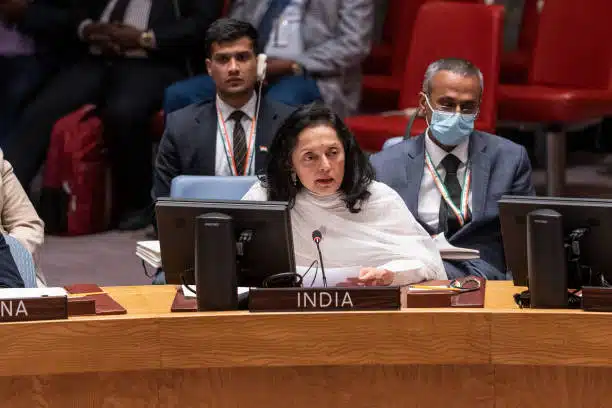- According to official media, North Korea’s Foreign Minister Choe Son-hui expressed “deep sadness” on Monday that the head of the United Nations denounced Pyongyang’s latest intercontinental ballistic missile (ICBM) launch.
- Yonhap news agency cited him as stating, “We recently advised the UN secretary-general to examine the situation of the Korean peninsula with impartiality and objectivity.”
- UN Secretary-General Antonio Guterres issued a statement on Friday strongly condemning North Korea’s launch of an ICBM earlier that day.
UNITED NATIONS: India has joined the United States and a dozen other nations in condemning North Korea’s recent launch of an intercontinental ballistic missile. New Delhi has expressed concern over the proliferation of nuclear and missile technologies, stating that they have an “adverse impact” on regional peace and security, including India’s.
Monday, India’s Permanent Representative to the United Nations, Ambassador Ruchira Kamboj, expressed New Delhi’s condemnation of North Korea’s recent launch of an intercontinental ballistic missile during a meeting of the United Nations Security Council, the second such meeting this month.
The latest North Korean missile launch, which occurred on November 18 and landed around 200 kilometres off the coast of Japan, followed many months of ballistic missile launches.
These launches, according to Kamboj, violate Security Council resolutions against the Democratic People’s Republic of Korea and threaten the peace and security of the area and beyond.
On behalf of Albania, Australia, Ecuador, France, Ireland, India, Japan, Malta, Norway, the Republic of Korea, Switzerland, the United Arab Emirates, the United Kingdom, and the United States, US Ambassador to the UN Linda Thomas-Greenfield issued a joint statement about the missile launch.
The joint statement sharply criticised both the November 18 launch of an intercontinental ballistic missile and the accompanying report in North Korea’s state-controlled media that it may be used for a preemptive nuclear strike. Kamboj stated that India demands complete implementation of the relevant United Nations Security Council resolutions against North Korea.
“We would also want to stress the necessity of combating the proliferation of DPRK-related nuclear and missile technology. The spread of nuclear and missile technologies is cause for worry, as they have a negative influence on peace and security in the area, particularly in India, said Kamboj, who added that New Delhi hopes the world community and the Security Council would unify on this issue. India reaffirms its commitment to denuclearization as a means to peace and security on the Korean peninsula.
“It is in our common interest to ensure peace and security on the Korean Peninsula. We will continue to promote communication and diplomacy as the methods to resolve concerns on the Korean Peninsula in the future “said the statement.
This was North Korea’s ninth intercontinental ballistic missile launch this year, according to the joint statement. “Compared to the total number of intercontinental ballistic missile launches before 2022, this represents a significant escalation and poses an unambiguous threat to international peace and security,” the statement said, adding that North Korea is acting with impunity due to the Security Council’s inaction.
Thomas-Greenfield stated that the 14 nations support the need for the Security Council to condemn North Korea’s actions with a unified voice and to take action to limit its unlawful development of weapons of mass destruction and ballistic missiles, particularly nuclear missile technologies in North Korea, the region, and beyond.

“We ask other member states to join us in denouncing the DPRK’s illegal ballistic missile launches and in calling for the full implementation of current Security Council resolutions. The joint declaration also urged the DPRK to abandon its illegal weapons programmes in a full, verifiable, and irreversible way.
Rosemary DiCarlo, the head of the UN’s Department of Political and Peacebuilding Affairs (DPPA), informed the gathering that the Hwasong-17 missile allegedly travelled 1,000 kilometres and reached an altitude of roughly 6,100 kilometres.
According to her, this is the first successful test of North Korea’s largest and most powerful missile, which is capable of reaching all of North America. She stated that the launch was the latest in a series of worrying acts North Korea did in 2022 concerning its nuclear bomb and ballistic missile programmes.
“North Korea’s continued pursuit of its nuclear weapons programme and launches of ballistic missiles flagrantly violate relevant Security Council resolutions and have led to a significant escalation of tensions,” the UN Under-Secretary-General stated, reiterating calls for the country to cease taking further provocative actions and to fully comply with its international obligations under relevant Security Council resolutions.
The Director General of the International Atomic Energy Agency (IAEA) announced on November 16 that North Korea’s Punggye-Ri nuclear test site “remains equipped to enable a nuclear test.”
“The IAEA has continued to monitor site operations. “It has also detected development at the Yongbyon nuclear facilities and evidence that the 5-megawatt nuclear reactor was operational,” DiCarlo added.
Noting that this was the tenth meeting of the council in 2022 to examine North Korea, she stated that the situation on the Korean Peninsula continues to deteriorate.
“The continuous missile launches, aggressive rhetoric, and military drills lead to a vicious cycle of action and reaction. The tensions continue to escalate, with no relief in sight. In addition, the COVID-19 epidemic impedes official and unofficial connections with the DPRK, so complicating diplomacy,” she stated.
The UN official emphasised that it is crucial to de-escalate and reduce tensions, emphasising that communication channels, particularly military-to-military contact, must be improved to limit the possibility of mistakes.
READ MORE:













